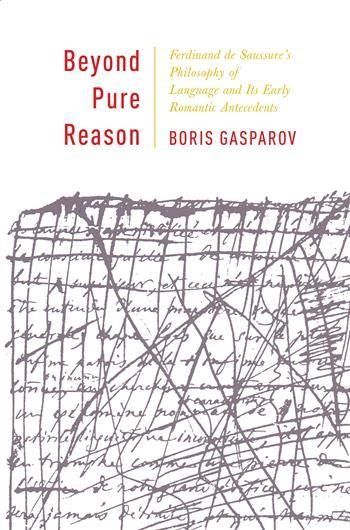The Swiss linguist Ferdinand de Saussure (1857–1913) revolutionized the study of language, signs, and discourse in the twentieth century. He successfully reconstructed the proto-Indo-European vowel system, advanced a conception of language as a system of arbitrary signs made meaningful through kinetic interrelationships, and developed a theory of the anagram so profound it gave rise to poststructural literary criticism.
The roots of these disparate, even contradictory achievements lie in the thought of Early German Romanticism, which Saussure consulted for its insight into the nature of meaning and discourse. Conducting the first comprehensive analysis of Saussure's intellectual heritage, Boris Gasparov links Sassurean notions of cognition, language, and history to early Romantic theories of cognition and the transmission of cultural memory. In particular, several fundamental categories of Saussure's philosophy of language, such as the differential nature of language, the mutability and immutability of semiotic values, and the duality of the signifier and the signified, are rooted in early Romantic theories of "progressive" cognition and child cognitive development. Consulting a wealth of sources only recently made available, Gasparov casts the seeming contradictions and paradoxes of Saussure's work as a genuine tension between the desire to bring linguistics and semiotics in line with modernist epistemology on the one hand, and Jena Romantics' awareness of language's dynamism and its transcendence of the boundaries of categorical reasoning on the other. Advancing a radical new understanding of Saussure, Gasparov reveals aspects of the intellectual's work previously overlooked by both his followers and his postmodern critics.
- Contents
- Acknowledgments
- Abbreviations
- Introduction: Saussure, "Saussurism," and "Saussurology"
- PART I Voluble Silence: Saussure and His Legacy
- 1. The Person
- The Roots
- Years of Learning
- Paris and Geneva
- 2. The Writings
- The Published and the Perishable
- Fragmentariness
- Reading the Course in General Linguistics
- PART 2 Postulates About Language and Their Demise
- 3. Antinomies of the Sign
- Linguistics in Search of its Subject
- The Double Nature of the Sign
- Arbitrariness and Negativity: Language as Pure Form
- Immutability and Mutability of Signs: An Indissoluble Antinomy
- Freedom and Aporia
- 4. Fragmentation and Progressivity: Saussure's Semiotics in the Mirror of Early Romantic Epistemology
- In Search of Saussure's Intellectual Roots
- A Missing Link From "Progressive Education" to "General Linguistics"
- The Speaker of La Langue and the Early Romantic Subject: Saussure and Novalis
- Asymmetry of the Sign: "Linearity" as a Philosophical Concept
- 5. Diachrony and History
- Toward Immutability: Constructing the Past
- Toward Immutability: Duration
- A World in Transition: Saussure and Friedrich Schlegel
- A Tentative Compromise: Linguistics as a "Natural" and a "Historical" Science
- PART 3 Language in Discourse
- 6. The Anagram
- 7. Linguistics of Speech: An Unrealizable Promise?
- From Language to Speech: Bridging the Metaphysical Gap
- "Linguistics of Speech" and "Romantic Poetry"
- The Mystery
- Conclusion: Freedom and Mystery - the Peripathetic Nature of Language
- Made in Leipzig
- From "Science" to Philosophy
- "To Have a System and to Have None is Equally Deadening for the Spirit"
- Anxiety and Stoicism
- Notes
- Works Cited
- Index

